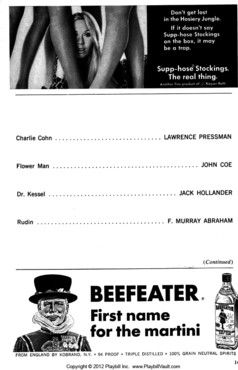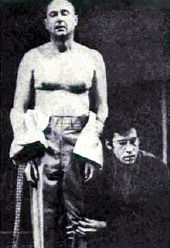
.com

Estd. 2020

Centenary
Project
2027
Approved by the Shaw Family

The Playwright
"He was an exceptional talent and a darling of a man."

As well as his five novels, Robert wrote three plays with mixed success. Here's a closer look at his stage writing.


“Writing is where the real centre of my integrity lies. I never write for money. I only act for money, but not invariably of course. I would never write certain sentences that I say in films, or even that I write in films, because I often fix up my lines.”
“Acting is instant enjoyment and childlike. As an actor, Lord God, I can take an audience in a theatre and throw them in any direction. I can’t do that as a writer. Writing is painful, it’s lonely and you suffer and there’s no immediate feedback.”
- Robert shaw
Off the Mainland
Set on a Balkan prison Island, the play centres on three characters Sandor Rimini, Laszlo Rimini and Constance Rimini. An account of the brutal torture of political prisoners that spills over into a bitter struggle between one family...
Written by Robert Shaw
cast
Robert Shaw as laszl0 rimini
Ralph Michael as sandor rimini
Constance Wake as constance rimini
Venue: The Arts Theatre, London
Dates: 8th May - 19th June 1956
"Opens strikingly before descending into crude melodrama" - The London Times
"Builds up tension and interest with a skill that argues a genuine sense of theatre." - Punch
The Man in the Glass Booth
A Jewish multimillionaire poses as a Nazi war criminal so that he may be put on trial in Israel and give the Jewish people a face on which to project their fantasies of the most vicious, unrepentant Nazi imaginable.
Written by Robert Shaw from his own Novel
Directed by Harold Pinter
Produced by Peter Bridge in association with Glasshouse Productions
Designed by Voytek
Lighting by Michael Northen
CAST
Arthur Goldman - Donald Pleasence
Charlie Cohn - Lawrence Pressman
Dr Kessel / Landau - Terence Lodge
Durer - Mark Powell
Flower Man - Leon Lissek
Guard - Edwin Kuks
Guard - Auton Low
Jack / Marowski - Simon Kelly
Mrs Levi - Margaret Gibson
Mrs Rosen - Yootha Joyce
Presiding Judge - Vernon Dobtcheff
Rudin / Tzelniker - Clifford Elkin
Sam - Mark Heath
Steiger - Iain Blair
Woman - Sonia Dresdel
Venue: St. Martin's Theatre, London
Dates: July 27th - December 17th 1967


The Man in the Glass Booth

Written by Robert Shaw from his own Novel
Directed by Harold Pinter
Produced by Edward M Meyers, Ivor David Balding and Associates Ltd, and Leslie Ogden
Designed by Ed Wittstein
Lighting by Jules Fisher
CAST
Arthur Goldman - Donald Pleasence
Arthur Goldman (replacement) - Jack Warden
Charlie Cohn - Lawrence Pressman
Dr Kessel / Prosecutor - Jack Hollander
Durer - Michael Ebert
Flower Man - John Coe
Guard - Walter Allen
Guard - Robert Anthony
Jack / Marowski - Madison Arnold
Judge- Ben Kapen
Judge - Martin Rudy
Landau - Abe Vigoda
Mrs Lehmann - Tresa Hughes
Mrs Levi - Florence Tarlow
Mrs Rosen - Ronnie L Gilbert
Presiding Judge - Boris Tumarin
Sam - Graham Brown
Sergeant - Clinton Atkinson
Steiger - Paul Manfred
Tzelniker / Rudin - F Murray Abraham
Venue: Royale Theatre, New York
Dates: September 26th 1968 - May 17th 1969
Previews: 12
Performances: 254
This, if you will pardon the frankness, is going to be a difficult notice to write. On the cover of the Playbill for Robert Shaw's The Man in the Glass Booth, which opened at the Royale Theater last night, is a diagrammatic picture of a man in a glass booth. The man is neatly split down the middle. The drawing symbolizes the play in more ways than one.
For one thing it symbolizes the hero---a paranoid New York tycoon put on trial in Israel, accused, like an Eichmann, of inhuman crimes against Jewry. For another thing, it symbolizes the structure of the play itself, for the two acts are very unequally balanced, and for myself I might have admired the second act more if I had admired the first act less.
Finally it seems to symbolize the success of the author himself, who appears to have set out to write a drama concerned with guilt, Jewishness, martyrdom and saintlike madness, and in fact appears to have ended with a simple melodrama, engrossing at its own level, and a fantastically effective vehicle for the bravura acting of Donald Pleasence and the subtly virtuoso directing of Harold Pinter.
The piece begins as stealthly as a Pinter play, as visually beautiful and dramatically mysterious as a Graham ballet. It is dimly lit, a robed figure prays at an alter, the air like incense, and around the walls strange cloud shapes are clustered. Suddenly the walls---which are louvered---turn outward to reveal the familiar New York skyline. The priestlike figure moves to his desk, puts on a jacket and is at once the multimillionaire financier and property tycoon, prince of Manhattan, creator of a whole empire of steel-veined palaces.
It is a superb opening, and from then on Mr. Shaw, Mr. Pinter and Mr. Pleasence surefootedly build the structure of the play. Mystery is piled on mystery, and yet while the purpose is still veiled, that there is to be a purpose appears clear. Arthur Goldman, 52 years old, Jewish refugee, widower, has in 20 years created a world. Eccentric, childlike, and yet with sharp shrewdness, Goldman is courted by his parasites, pampered by the acolytes of his religious millions. Whimsical and arrogantly sure of himself, he nevertheless has a fear. People are watching him. Forces are closing in.
He is arrested by Israeli secret agents. Instead of Arthur Goldman, he is, it is charged, Adolf Dorff---an S.S. colonel, torturer and killer. Goldman does not deny the claim. He lets himself be abducted to Israel (although an American citizen) and stands trial. Rather than denying the crimes he glories in them. He deliberately offends the slumbering conscience of a world by insisting on wearing an S.S. uniform and from a bullet-proof glass box in an Israeli courtroom haranguing the court and the world with childish boasts of atrocity and paranoid filth about racism and Hitler.
But the Israelis have the wrong man. He is a Jew. He is Goldman. And he wants to be a martyr---like a Christ killed for the benefit of mankind.
The difficulty is that the play never once convinced me of its basic premises. The solution is all too simple. How could the Israelis have made such a mistake? How could the court accept, so meekly, without a shred of supporting evidence the solitary statement of one woman who says she knew the accused? And such questions are not trifling, for they are what finally cuts Mr. Shaw's play down to size.
Engrossing the play certainly is. But it has nothing to say about any of the subjects it hints it is going to illuminate. For its pretensions are based on totally false premises---what it says happened could not and would not have happened. We are in the lurid world of melodrama. A world filled with clever-looking and clever-sounding props (an obviously fake Rembrandt or an account of Y.A. Tittle's last game with the Giants---and the latter from an English playwright who I suspect knows as much about American football as I do myself) and yet a world in which reality can cast no true dramatic shadows.
The play will, justifiably, be talked about. And much of the conversation will, also justifiably, be of Donald Pleasence and his remarkable performance as the paranoiac Jew. When I saw the play in London a year or so ago, I was vastly impressed with Mr. Pleasence. And now I am lost in admiration. The portrayal has the intensity of madness, it convinces against one's intellect, and it thrills with its sheer, remorseless virtuosity.
Mr. Pleasence starts slowly, marking with a studied jocularity the mild eccentricities of the rich. The Jewish jokes (which incidentally have been excellently conceived by Mr. Shaw) are given with a convincingly deprecating bitterness, and the growing signs of paranoia are sketched in with a lovingly clinical skill.
Then Mr. Pleasence takes off in flight. As the play, imperceptively at first, loses touch with life, so then does Mr. Pleasence. Now he is a monster, now the acting is melodramatic, but wonderfully melodramatic. A year ago Mr. Pleasence had difficulty with his accent---now this is perfect, and the change is typical of the honing process that the whole role has undergone. So that toward the end when the eyes glitter beadily in a tight-skinned skull, or, right at the conclusion, beaten like an old monkey yet still stubbornly defending his madness, Mr. Pleasence shows more than a touch of genius.
But then so does Mr. Pinter. He has directed the play with just the right regard for shifts of emotion that Hitchcock shows in the movies. It reminded me of what a fine movie The Man in the Glass Booth might very well become.
CLIVE BARNES - NEW YORK TIMES

Cato Street
The Cato Street Conspiracy was an attempt to murder all the British cabinet ministers and the Prime Minister, Lord Liverpool, in 1820. The name comes from the meeting place near Edgware Road in London. The police had an informer; the plotters fell into a police trap. Thirteen were arrested, while one policeman, Richard Smither, was killed. Five conspirators were executed, and five others were transported to Australia.
Written by Robert Shaw
Directed by Frank Dunlop
Produced by Michael White with Thistlewood Productions and The Young Vic Company
CAST
Vanessa Redgrave
Bob Hoskins
Norman Beaton
James Hazeldine
Malcolm Tierney
Alec Heggie
Louis Mahoney
John Arnatt
George Innes
Scenic Design by William Dudley
Costume Design by Deidre Clancy






























